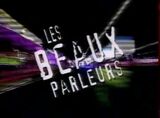| Hosts | |
| Patrice L'Ecuyer (2001-2002) | |
| Broadcast | |
| Radio-Canada: 2001-2002 | |
Les Beaux Parleurs (Fine Speakers) is a French-Canadian adaptation of the American game show Street Smarts.
Gameplay[]
Two in-studio contestants compete in a game where they faced three on-the-street people, known as "street players" for cash.
To start, the two studio contestants were introduced, as well as the three street players, whose interviews were pre-recorded.
Round 1: Qui a Raison?[]
In this round called "Qui a Raison?" (Who's Right?), the contestants tried to predict which of the three street savants gave the correct answer to a question. Three questions were played in this round, and each correct prediction was worth 50$.
Round 2: Qui a Tort?[]
In this round called "Who Blew It?" (Who's Wrong?), the contestants tried to predict who gave an incorrect answer to a question; for each question, only two of the street savants are considered (one of whom answered correctly). Again, three questions were played this round, but in this round, each correct prediction was worth 100$.
In addition, there was also a "Dunce Cap" placed in between the studio players. When a question was asked, and if either player thought that his/her opponent didn't know the answer, he/she then had to hit their buzzer and place the dunce cap on his/her opponent's head (In the pilot, the contestant chairs lacked the buzzers but the player would simply just place the dunce cap on the opponent's head). The "dunced" player was then allowed to hear the question in its entirety, and must then answer the question within 5 seconds. If the "dunced" player answered wrong, 100$ goes to the person who hit the buzzer and the "dunced" player continued to wear the dunce cap. However, if the "dunced" player was correct, he/she won the 100$ for himself/herself, and the challenger became the dunce (that is, the person who hit the buzzer originally). Also, only one dunce cap opportunity is available.
Round 3: C'est Mon Choix![]
In this round called "C'est Mon Choix!" (It's My Choice!), each contestant picked which of the three street partner to play with as their partner for the entire round. Each question goes to an individual contestant, who must predict whether their parter got the question right or wrong. Four questions are asked of each contestant, for a total of eight in the round. Each correct prediction was worth 150$. The "Dunce Cap" was back in play in this round, with its value upped to 150$ as well.
The "right" reference is indicated by a "Thumbs Up" picture on a green background; the "wrong" reference is indicated by a "Thumbs Down" picture on a red background.
Final Round: Fautes Vous Jeux![]
The final round was called Fautes Vous Jeux! (Place Your Bets!) because the studio contestants now wagered any or all of their current dollar total on any one of the three street players. To start, the final question was asked before the final commercial break, after that, that's when the contestants, in secret, made their wagers, chose their street player, and predicted whether the chosen savant answered the question right or wrong. A correct prediction added the wager, but an incorrect prediction deducted the wager. The player with the most money at the end of this round won the game. NOTE: The unused clips from this round would be shown during the first portion of the closing credits.
The winner of the game got to keep their cash and returned on the next show to play again. In the event that both players went all-in and predicted incorrectly, the game ended with no winner. If the game ended in a non-$0 tie, a final tie-breaker question was asked to the studio contestants. The first player to buzz-in with a correct answer won the game, but if that player buzzed in and was incorrect, the opponent automatically won the game. When a player buzzed in, he/she had the option to either answer the question him/herself or pass the question to his/her opponent; if the player buzzed in before the question was complete, and elected to answer it themselves, they had to give their answer based on what was heard; if the player passed, then the player being passed the question got to hear it in full.
Links[]
Radio-Canada's Official site for Les Beaux Parleurs (via Internet Archive)
Les Beaux Parleurs @ Avanti Cine Video
